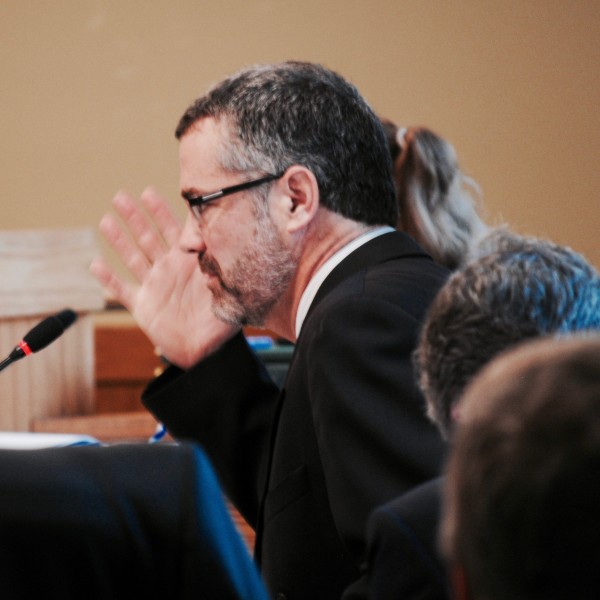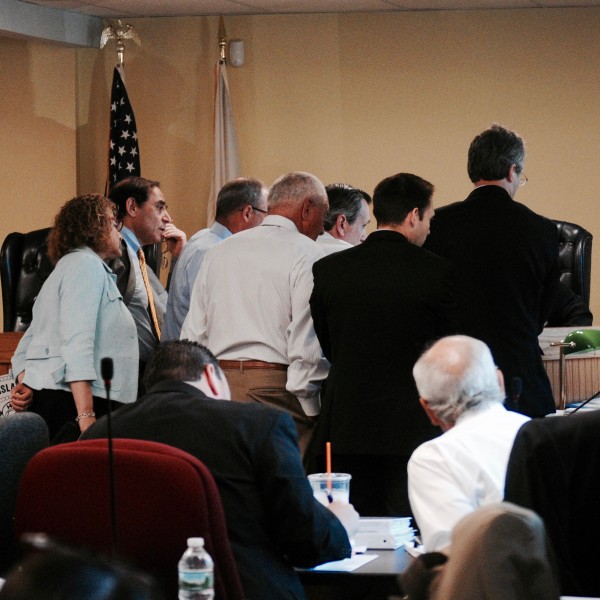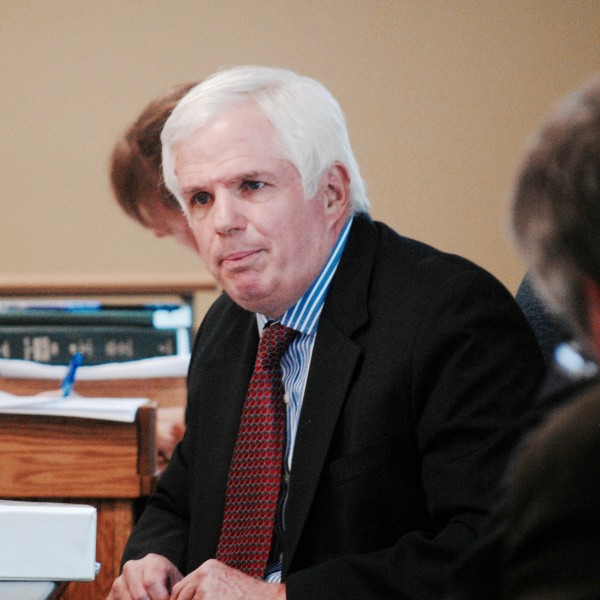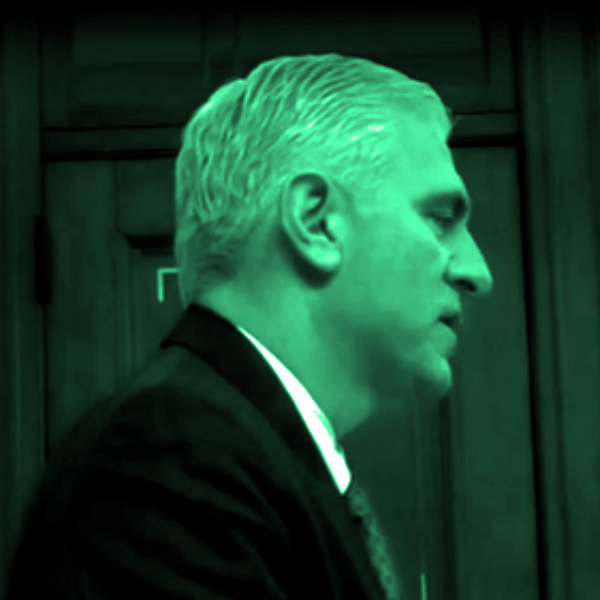
On the second day of the RI Public Utilities Commission (RIPUC)’s evidentiary hearing concerning Invenergy‘s proposed $700 million fracked gas and diesel oil burning power plant, to be located in Burrillville, Jerry Elmer of the Conservation Law Foundation (CLF) presented his witnesses who argued that the power plant is not needed and that it’s effect on ratepayers would be negligible.
The CLF’s case is one of nuance, and much depends on the views of Commissioner Herbert DeSimone Jr. DeSimone is the one commissioner on the PUC board that did not recuse themself, and the one commissioner who will write the RIPUC’s advisory opinion to the Energy Facilities Siting Board (EFSB), the body ultimately responsible for deciding on the plant. Invenergy is making the case that since the proposed plant has already sold half its capacity in an energy futures market run by ISO-NE, the plant is by definition needed. This is the default position not only of Invenergy, but also of the RI Office of Energy Resources (OER) and the RIPUC, if the questioning from their attorneys at the hearing are any indication.

The CLF is maintaining that what ISO-NE did was purchase extra power, and if Invenergy’s plant is taken out, there will still be more than enough electricity on the grid to power all of New England. Also, going forward, as more and more renewables come on line, the need for the plant will go down, not increase. Unfortunately, ISO-NE is somewhat of a black box. Though they publish thousands of pages on how their energy auctions are run, figuring out why one plant’s energy was purchased and another was not is virtually impossible, and no one from ISO-NE was at the hearing to answer questions.
As for ratepayer savings, on the first day of the hearing Invenergy’s attorney Alan Shoer called his witnesses and made his case that the savings to ratepayers would be significant. On the stand, John Niland, director of development for Invenergy admitted that the $280 million number he gave to Burrillville residents earlier in the year was false, and that he knew it was false when he presented it. The true number was closer to $36 million in rate payer savings.

The CLF’s witness, Christopher Stix, also ruled out the $280 million number, saying it took him one week after the ISO-NE auction results were published to perform his calculations that the actual savings ranged from between zero and $36 million. John Niland testified that Invenergy did not know this number when he falsely gave the $280 million figure to the audience in Burrillville seven weeks after the auction published its results.
It is up to DeSimone to decide whether or not a savings of between zero and $36 million to rate payers is worth the additional pollution, the despoilment of Burrillville’s pristine habitats and the continued dependency on fracked gas for our energy needs in New England for decades to come. It is worth noting that $280 million was a number too big to ignore, from an economic standpoint, where as zero to $36 million (which is a bell curve, the actual number may be closer to $20 million) is not nearly as tantalizing.
The CLF’s first witness, Robert Fagan, testified for a marathon five hours.

“We know now is that the Invenergy plant is not needed for electrical needs in New England,” said Fagan, and under cross examination he did not falter.
Getting through Fagan’s testimony required defining a host of terms and acronyms. ICR, LOLE, NERC, sloping versus vertical demand curves etc. were defined and discussed. It was very technical, but it served two functions. One, it established Fagan’s expertise, something Invenergy tried to call into question in pre-filed testimony, and two, it helped prove Fagan’s case that the proposed power plant was not necessary.
Though high-powered attorneys Alan Shoer and Jerry Elmer set the tone for the meeting, it’s most likely that RIPUC attorney Cynthia Wilson-Frias will have the most impact on Commissioner DeSimone’s advisory opinion, given that she will likely help author it and DeSimone can be expected to lean heavily on RIPUC’s in house legal expertise. Wilson-Frias asked pointed questions about the fact that Invenergy already sold some of its expected output to ISO-NE. She indicated that since the energy sold, it is by definition needed. Fagan countered this logic well, his entire testimony was in fact a rebuttal of sorts to this idea, so it comes down to how much weight Wilson-Frias gives Fagan’s views versus the more mainstream “free” market ideas favored by Invenergy.
The last day of the hearing is today, and unfortunately I will not be in attendance. I hope to get an update from Jerry Elmer after the hearing.
You can view the entire days proceedings below:
]]>
State Rep Aaron Regunberg’s bill to allow net metering and virtual net metering in Rhode Island, (House Bill No.7585) heard in House Corporations Tuesday evening, was met with an outpouring of support from business owners and conservationists. The only people who spoke against the idea were representatives for National Grid, the RI Public Utilities Commission (PUC), and the RI Office for Energy Resources (OER).
Net metering allows people to generate their own electricity- think solar panels, wind turbines, or even exercise bikes- in order to reduce their electric bills or even to sell their surplus electricity to their neighbors. Virtual Net Metering allows people to pool resources and develop solar and wind farms off their property, yet still reap the benefits of reducing or reversing the costs of electricity.
This is a big win for consumers in states like Massachusetts, where the solar rooftop industry is flourishing. During testimony, five representatives from solar companies testified in favor of the bill. They testified that the regulatory climate in Massachusetts has allowed their businesses to boom there. In Rhode Island, it is much more difficult to make the numbers work, if they can at all, because of the laws and regulations here that protect the interests of a multi-billion dollar, out of state corporations like National Grid.
Christopher Kearns, representing the RI Office of Energy Resources and the Governor’s office, said that net metering is “touched upon” in Governor Gina Raimondo’s budget and that they would prefer all net metering policy decisions be determined there.
I’ve spoken about the anti-democratic nature of inserting policy into the budget in the past. When the General Assembly prevented cities and towns from determining their own minimum wages, it was done as a budget item. When Gina Raimondo messed with abortion coverage in HealthSourceRI, it was done as a budget item. Both these decisions were disasters for poor and working class Rhode Islanders.
 I maintain that the reason to insert policy into the budget rather than through an open legislative process is to prevent public input and public discussion on vital issues and to concentrate power into the hands of a small group of legislators and the Governor’s office. As of this writing Kearns has not responded to a request for comment on this.
I maintain that the reason to insert policy into the budget rather than through an open legislative process is to prevent public input and public discussion on vital issues and to concentrate power into the hands of a small group of legislators and the Governor’s office. As of this writing Kearns has not responded to a request for comment on this.
Cynthia Wilson-Frias, Deputy Chief Counsel for the Rhode Island Public Utilities Commission, also spoke against the proposal. The PUC effectively exists to rubber stamp National Grid’s periodic rate increases. The PUC is also working with the Governor’s office and the OER on a version of net metering. She said that the bill seems over broad and might put the state at risk of violating federal laws. Of course, if Massachusetts can do this, why can’t Rhode Island?
That leads me to the last objector, Frank McMahon of National Grid. Speaking with the casual disdain of someone who knows that the power is on his side, McMahon told the room that he doesn’t want to bore us with the “technical reasons” of National Grid’s objections. McMahon agreed with the the PUC and the OER that net metering is a subject best kept within the confines of the Governor’s budget article, where, it can be presumed, his lobbying efforts will have the greatest impact.
You can watch Regunberg’s presentation of his bill and the testimony here:
You can also watch all the testimony concerning Rep Regunberg’s other bill, House Bill No.7514 in the video below. This bill, also opposed by the PUC and National Grid, would require “the division of public utilities and carriers and the public utilities commission to include climate, environmental, employment, health and consumer concerns in all their proceedings and decisions.”
Watch as Wilson-Frias of the PUC objects to the bill on the grounds that the PUC’s “primary role is to approve rates sufficient to provide a utility to engage in providing a safe, reliable service…”
In other words, climate, environmental, employment, health and consumer concerns are secondary to a utility’s ability to make a profit.
As long as that is true, effective action against climate change and towards energy independence will be impossible.
]]>